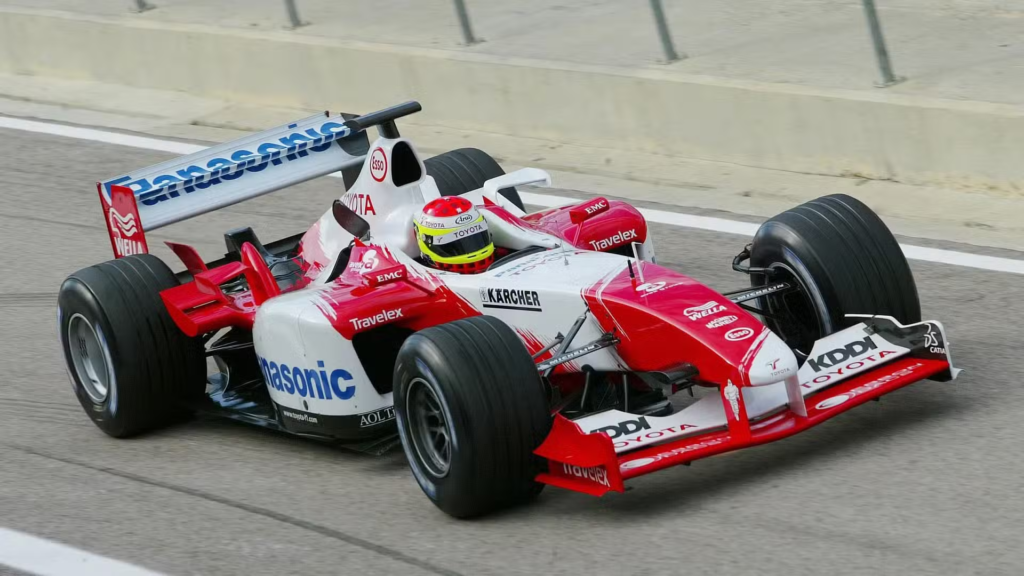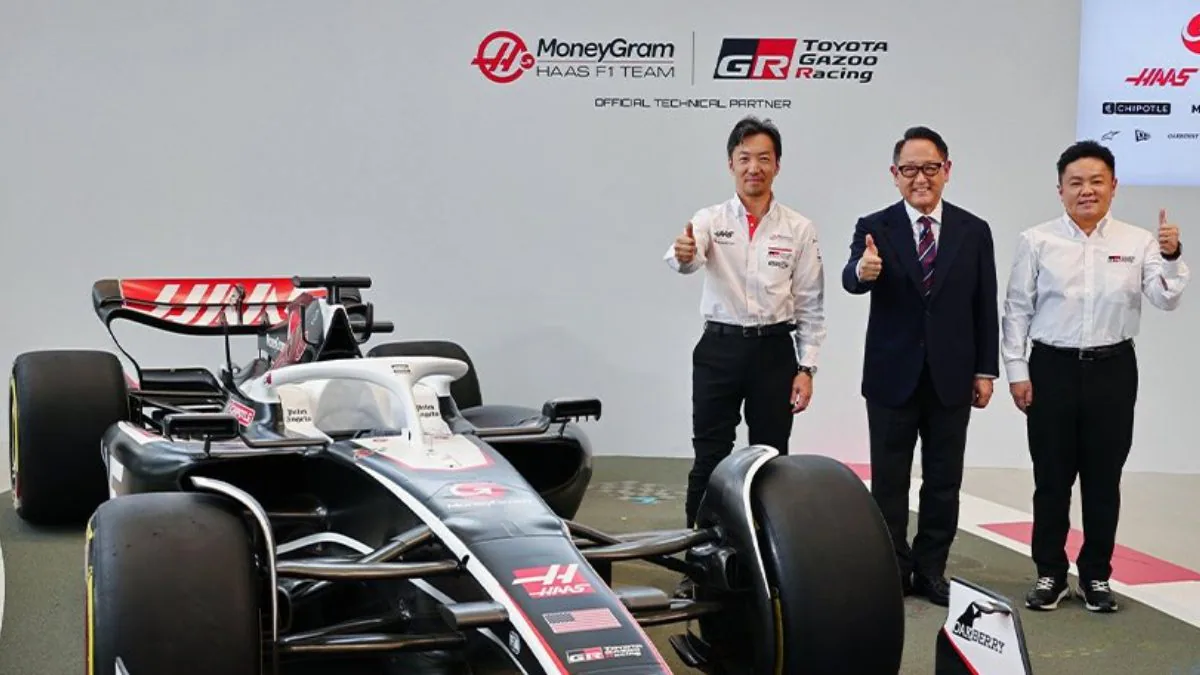After 15 years away from the world of Formula 1, Toyota is making a much-anticipated return to the sport, although not in the same capacity as its previous works team. The Japanese automotive giant, known for its racing pedigree, is now entering Formula 1 in a technical partnership with the U.S.-based Haas F1 Team.
This collaboration marks a new chapter for both Toyota and Haas as they look to leverage each other’s strengths to compete in one of the most challenging and prestigious motorsports in the world.
Toyota’s F1 History: A Lavish But Fruitless Journey
Toyota’s history in Formula 1 dates back to 2002, when the company made an ambitious entry into the sport. As one of the wealthiest automakers globally, Toyota entered Formula 1 with the goal of building a title-winning team. Over the course of eight seasons, from 2002 to 2009, the team spent lavishly in pursuit of success.
Read : Florida Highway Full of Cars as People Evacuate Ahead of Hurricane Milton
However, despite the massive financial investment, the team never won a single race. Toyota’s best results came in the form of podium finishes and near-misses, but the elusive victory always slipped away.
Read : Car Theft Capital of the World: Canada Ranks First with One Car Stolen Every Five Minutes
The most prominent issue during Toyota’s tenure in Formula 1 was its inability to translate its resources into consistent results. While the team showed flashes of potential, especially in the 2005 and 2009 seasons, where they achieved multiple podium finishes, they struggled to maintain momentum and capitalize on race-winning opportunities.
Toyota’s lack of success on the track stood in stark contrast to its dominant performance in other racing disciplines, such as endurance racing and rallying.

In 2009, following the global financial crisis and the need for cost-cutting measures, Toyota made the sudden decision to withdraw from Formula 1, even though the team had already designed most of its car for the following season. The announcement shocked the motorsport community, marking the end of Toyota’s involvement in Formula 1.
Since then, the company has focused on other motorsports like NASCAR, rally racing, and the prestigious Le Mans 24-hour race, where Toyota has established itself as a dominant force, especially in its rivalry with Ferrari.
The New Era: Technical Partnership with Haas
Toyota’s return to Formula 1 in 2024 is not as a fully-fledged works team but as a technical partner to Haas, a relatively young team in the Formula 1 paddock. The U.S.-based Haas team made its debut in 2016 and quickly established itself as a midfield contender, thanks to its close partnership with Ferrari.
Haas has relied on Ferrari engines since its inception, and that partnership will continue until 2028 under the terms of a recently extended agreement.
However, with the new technical partnership, Toyota will not be supplying engines to Haas. Instead, Toyota’s involvement will focus on providing design, technical, and manufacturing services to help Haas optimize its car performance.
The Toyota branding will appear on the Haas cars starting from the United States Grand Prix in Austin, Texas, marking the start of the collaboration. This multi-year agreement is designed to enhance Haas’ competitiveness in the sport and help the team as it navigates the upcoming regulatory changes set to be introduced in 2026.
While the Toyota-Haas partnership is not expected to result in a complete transformation of the Haas team, it does open the door for Toyota to bring its technical expertise to Formula 1 once again.
The automaker’s Gazoo Racing division, known for its success in endurance racing, will be working closely with Haas to cultivate talent, including drivers, engineers, and mechanics.
Tomoya Takahashi, head of Toyota’s Gazoo Racing division, has emphasized the importance of developing human capital through this partnership, signaling that Toyota is thinking long-term about its involvement in Formula 1.

Despite Toyota’s return to the sport, it is important to note that this does not mark the revival of the Toyota works team. Haas will continue to race under its own name, and Toyota’s role will primarily be supportive, focusing on areas where it can make a meaningful contribution to Haas’ performance without taking on the full responsibilities of a team owner or engine supplier.
The Implications for Haas and Formula 1
The Toyota-Haas partnership comes at a crucial time for the Haas team, which is currently working to stay competitive in a rapidly evolving Formula 1 landscape. With new regulations set to come into force in 2026, teams are looking for every possible advantage to stay ahead of the competition.
Haas’ decision to extend its partnership with Ferrari for engine supply until 2028 shows the team’s commitment to securing a strong power unit, but the technical expertise from Toyota could be the key to unlocking more performance from their chassis and overall car design.
Haas has also made strategic moves in its driver lineup, securing two talented drivers for the 2025 season: Ferrari reserve driver Oliver Bearman and the experienced Esteban Ocon, who is currently driving for Alpine.
These drivers will bring a mix of youth and experience to the team, and the addition of Toyota’s technical input could help Haas become a more consistent performer in the midfield and potentially challenge for podium finishes.
For Toyota, this partnership represents a measured return to the sport it once sought to conquer. Instead of committing to the full financial and logistical burden of running a works team, Toyota can dip its toes back into Formula 1 through Haas.
This approach allows Toyota to contribute its technical expertise while avoiding the pitfalls that plagued its previous entry into the sport. By aligning itself with Haas, a team that has shown resilience and growth since its debut, Toyota can rebuild its presence in Formula 1 in a more strategic and sustainable way.

The collaboration between Toyota and Haas also brings a new dimension to Formula 1’s ever-evolving ecosystem. The sport has long been dominated by a few powerhouse teams, such as Mercedes, Red Bull, and Ferrari, but the presence of technical partnerships like the one between Toyota and Haas could help shake up the competitive order.
With more manufacturers contributing in different ways, Formula 1 could see more diversity in terms of technical innovation, team performance, and driver development.
Looking Ahead: Will Toyota Go Beyond Technical Partnerships?
While Toyota’s current focus is on supporting Haas as a technical partner, there are growing speculations about the automaker’s long-term ambitions in Formula 1. The multi-year agreement with Haas could be a stepping stone for Toyota to gradually increase its involvement in the sport.
Although Toyota is not supplying engines at this stage, the company’s expertise in hybrid technology and its experience in other motorsports could position it as a potential engine supplier for Formula 1 in the future.
Formula 1 is currently undergoing significant changes, particularly with the introduction of new engine regulations in 2026, which will place greater emphasis on sustainable and hybrid powertrains.
Toyota, with its deep knowledge of hybrid systems from its Le Mans and endurance racing programs, could eventually decide to develop a Formula 1 power unit to supply to teams. This would not only allow Toyota to have a more direct impact on race outcomes but also enhance its brand presence in the sport.

Another area of interest is driver development. The announcement of the Toyota-Haas partnership hinted at the possibility of Toyota placing a driver with Haas in the future, although the team’s current driver lineup is set for 2025.
Toyota has a history of cultivating young driving talent through its various motorsport programs, and the partnership with Haas could provide a pathway for Toyota-backed drivers to enter Formula 1.
This would further strengthen Toyota’s involvement in the sport and potentially give the automaker a stronger influence over the team’s performance.
As Toyota and Haas embark on this new chapter together, the motorsport world will be watching closely to see how the partnership evolves.
While Toyota may not be aiming for immediate race wins or championships, the combination of Haas’ hunger for success and Toyota’s technical capabilities could yield exciting results in the coming years.
Whether this partnership leads to further involvement from Toyota remains to be seen, but it is clear that the Japanese automaker is once again setting its sights on Formula 1, albeit with a more strategic and calculated approach.

